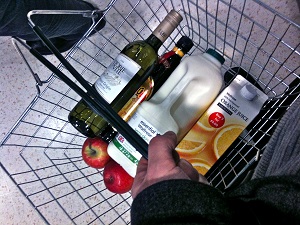 2014 was not a good year for Tesco. After decades of fabulous results, awards and plaudits, it all came crashing down. Experts have pointed to Tesco’s many failings: ill-conceived oversees exploits and a high-handed approach to suppliers (not to mention some allegedly dodgy accounting). But the heart of Tesco’s problems lies in missing the biggest trend in shopping, arguably since supermarkets were invented. Shopping behavior is changing – trips are fragmenting. And that has, and will have, huge implications for retailers, and for brand marketers.
2014 was not a good year for Tesco. After decades of fabulous results, awards and plaudits, it all came crashing down. Experts have pointed to Tesco’s many failings: ill-conceived oversees exploits and a high-handed approach to suppliers (not to mention some allegedly dodgy accounting). But the heart of Tesco’s problems lies in missing the biggest trend in shopping, arguably since supermarkets were invented. Shopping behavior is changing – trips are fragmenting. And that has, and will have, huge implications for retailers, and for brand marketers.
What happened?
In short, the internet. The internet made it possible for companies to offer differentiated offers to smaller niches, profitably. The number of people wanting to buy say, fresh coffee beans and roast them themselves, is tiny in any given town (making it hard to justify a supermarket listing, let alone marketing) but across the country, and the world, there are enough to drive a business. The internet’s big impact wasn’t online shopping, it was the ability to reach shoppers anywhere, at a meaningful cost. The impact of online was marketing first, distribution second. Shoppers are now able to choose not just what they buy, but where and how they buy it too!
How and why is shopper behavior changing?
I was back in the UK recently and I was amazed at the transformation in the shopping behavior of friends and family. My mum used to buy most of her groceries from either Tesco or Sainsbury. Today her shopping behavior is quite different. She still does her regular shop at the supermarket, but many of these are online, and the basket is noticeably smaller. And this is happening across the globe because shoppers have different attitudes to different categories, yet supermarkets treat them all largely the same.
Supermarkets aim to offer a great range at great prices in all the categories in which they participate. The trouble is that might work for the average shopper, but as we all know, there is no such thing as the average shopper.We all have categories that we love, and we really want to get involved in. There are other categories we care less about, and others we don’t care at all about. In fact, our relationships vary dramatically. I don’t have any particular love for toothpaste, but it simply must be in stock all of the time. I love red wine, but life will go on (just about!) if the wine rack is empty. We want different things from different categories and that drives different shopper behavior. Critically, our relationship with the category as a consumer is not the same as our relationship as a shopper, Let’s take a look at that.
The categories I love as a shopper and as a consumer
Shoppers want choice in the categories they love. Supermarkets and superstores try and do this, but because they try and do it for every category, they naturally fall short. My brother-in-law is mad about coffee. He roasts his own beans (which he orders on line and delivers). That might be a tiny niche, but of course the internet allows for a company to make a business out of that tiny niche. My mum buys coffee capsules for her N’espresso machine from Café Direct – because she likes the taste, they deliver in bulk so she gets a good price, and she is therefore always in stock at home and so never risks missing a cup of her favorite brew. That’s another chunk out of the Tesco shopping basket. My parents buy their wine from Virgin, citing that they have a better range, better quality, and prices to match the big supermarkets. I get beer delivered to me every month – a different mix of beers each month so I can easily try different things
The categories I don’t care about
Marketers, I’m sorry. You may love your brand, but not everyone does. Yes, you may have many tens of thousands of likes on your Facebook page but the majority of shoppers buying the majority of categories don’t care that much. Discounters such as Aldi and Lidl step in here. Anyone thinking that these chains are just for people on a budget, think again. In the UK 50% of people shop at one of these chains. Not because they are broke, but because there are categories they don’t care so much about. And spending less time and money on, say, rice and potatoes, leaves loads more time to spend drooling over the website at a category you really love.
The categories I love as a consumer but don’t love as a shopper
Everyone has these. I love my disposable contact lenses and can’t imagine functioning without them, but there is little joy in shopping for them. This is where subscriptions come in. Always in stock at home, but no need to actually shop? That is perfect. In the US, , overcoming any embarrassing moments in the store perhaps? Again, serving the consumer when the shopper isn’t interested.
What place does the supermarket have in all this?
And lest anyone think that I don’t like supermarkets, I do! I like them because they do throw lots of stuff together and I can get a lot of stuff I need to get. After all there are lots of categories that I want, but buying online doesn’t seem to work. Most of all, I like the bargain hunting. I like a great deal, and seek them out with a passion. Deal hunting in-store feels much more fun than doing it online; or at least to me. So supermarkets may have a place in the world of the fragmented shopper. The question is, can it be made profitable given this radical shift in shopper behavior? If store traffic drops, and basket sizes are eroded, are stores sustainable? If promotions and deals are required to drive more and more of the basket, who pays for that (and at some point, suppliers will be forced to say “NO†or be forced out of business.
The world of grocery retailing is changing, and it is driven by radical shifts in the behavior of shoppers. Treating all shoppers the same is simply not good enough. Shopper marketing is about developing a deep understanding of shoppers and using that knowledge to create an offer that delivers what those shoppers need. Shoppers have changed and organizations who have simply not spotted that, or have ignored it, are now facing huge difficulties. If you’d like to know more about shoppers, shopper behavior or shopper marketing, order a copy of “The Shopper Marketing Revolutionâ€
Image: Flickr



